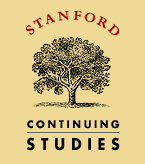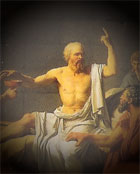Democritus
1.
I came to Athens and no one knew me.
(Diogenes Laertius, Lives of the Philosophers IX 36)
2.
If the same atoms endure, being impassive, it is clear that [the Democriteans] too will say that the worlds are altered rather than destroyed - just as Empedocles and Heraclitus seem to think. An extract from Aristotle's work On Democritus will show what the view of these men was:
Democritus thinks that the nature of eternal things consists in small substances, infinite in quantity, and for them he posits a place, distinct from them and infinite in extent. He calls place by the names 'void', 'nothing', and 'infinite'; and each of the substances he calls 'thing', 'solid' and 'being'. He thinks that the substances are so small that they escape our senses, and that they possess all sorts of forms and all sorts of shapes and differences in magnitude. From them, as from elements, he was able to generate and compound visible and perceptible bodies. The atoms struggle and are carried about in the void because of their dissimilarities and the other differences mentioned, and as they are carried about they collide and are bounded together in a binding which makes them touch and be contiguous with one another but which does not genuinely produce any other single nature whatever from them; for it is utterly silly to think that two or more things could ever become one. He explains how the substances remain together in terms of the ways in which the bodies entangle with and grasp hold of one another; for some of them are uneven, some hooked, some concave, some convex, and others have innumerable other differences. So he thinks that they hold on to one another and remain together up to the time when some stronger force reaches them from their environment and shakes them and scatters them apart. He speaks of generation and of its contrary, dissolution, not only in connection with animals but also in connection with plants and worlds - and in general with all perceptible bodies. [Aristotle, fragment 208]
(Simplicius, Commentary on On the Heavens 294.30-295.22)
3.
Democritus sometimes does away with what appears to the senses and says that nothing of this sort appears in truth but only in opinion, truth among the things that exist lying in the fact that there are atoms and void. For he says:
By convention sweet and by convention bitter, by convention hot, by convention cold, by convention colour: in reality atoms and void. [B 125]
That is to say, objects of perception are thought and believed to exist but they do not exist in truth - only atoms and void do.
In his Buttresses, although he undertakes to ascribe reliable power to the senses, he is found nonetheless condemning them. For he says:
We in reality know nothing firmly but only as it changes in accordance with the condition of the body and of the things which enter it and of the things which resist it. [B 9]
And again he says:
That in reality we do not know how each thing is or is not has been shown in many ways. [B 10]
And in On Ideas he says:
And a man must recognize by this rule that he is removed from reality; [B 6]
and again:
This argument too shows that in reality we know nothing about anything, but our belief in each case is a changing of shape; [B 7]
and again:
Yet it will be clear that to know how each thing is in reality is a puzzle. [B 8]
Now in these passages he does away in effect with all knowledge, even if it is only the senses which he explicitly attacks. But in the Rules he says that there are two forms of knowledge, one by way of the senses and the other by way of the understanding. The one by way of the understanding he calls genuine, ascribing reliability to it with regard to the discrimination of truth; the one by way of the senses he names dark, denying that it is unerring with regard to the discernment of what is true. These are his words:
There are two forms of knowledge, one genuine and the other dark. To the dark belong all these: sight, hearing, smell, taste, touch. The dark, separated from this <...>. [B 11a]
Then, setting the genuine above the dark, he continues thus:
When the dark can no longer see more finely or hear or smell or taste or perceive by touch, *but something finer* <...> [B 11b]
So according to Democritus, reason, which he calls genuine knowledge, is the standard of truth.
But Diotimus said that he supposed three standards: for the apprehension of what is unclear the standard is the apparent (for what appears is the sight of what is unclear, as Anaxagoras says - and Democritus praised him for this); for investigation, it is the concept ('for in every case, my friend, one principle is to know what the investigation is about' [Plato, Phaedrus 273B]); of course and avoidance, it is the passions - for that which we find congenial is to be chosen and that which we find alien is to be avoided.
(Sextus Empiricus, Against the Mathematicians VII 135-140)
4.
You cannot say that every impression is true, because of the reversal - as Democritus and Plato showed in their reply to Protagoras. For if every impression is true, then it will also be true that not every impression is true (since that is an impression), and thus it will be false that every impression is true.
(Sextus Empiricus, Against the Mathematicians VII 389-390)
5.
The dispute between body and soul over the passions seems to be an old one. Democritus, ascribing unhappiness to the soul, says:
If the body were to take the soul to court for the pains and sufferings it had endured throughout its life, then if he were to be the jury for the case he would gladly caste his vote against the soul inasmuch as it had destroyed some parts of the body by negligence or dissipated them by drunkenness, and had ruined and ravaged other parts by its pursuits - just as he would blame the careless user if a tool or utensil were in a bad condition. [B 159]
(Plutarch, On Desire and Grief)

